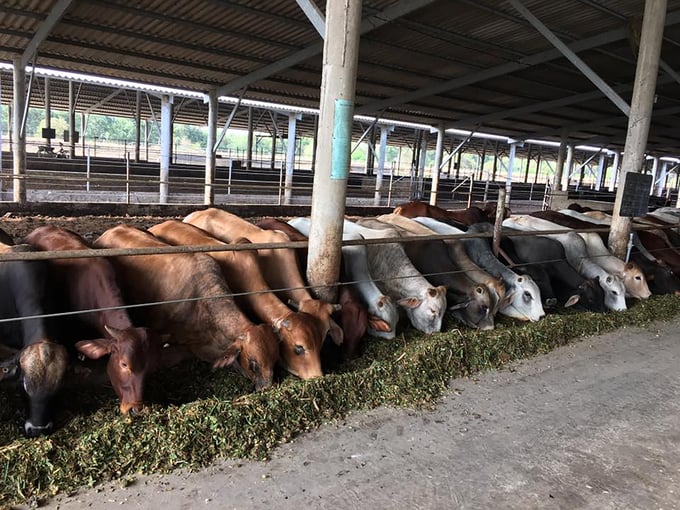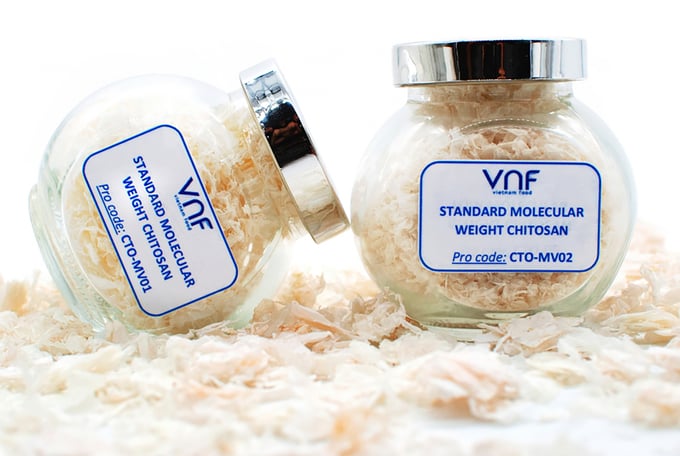June 21, 2025 | 02:47 GMT +7
June 21, 2025 | 02:47 GMT +7
Hotline: 0913.378.918
June 21, 2025 | 02:47 GMT +7
Hotline: 0913.378.918

A closed breeding-cultivation model. Photo: Minh Sang.
Mr. Vo Quang Huy, Director of Long An - My Binh Co., Ltd (Long An province), said that stemming from the need for organic fertilizer for cultivation, he had just started raising cows, leaving the remainder to grow crops... The closed breeding-cultivation model started from there.
The cow shed rows hundreds of meters long are sprayed with a microorganism that specializes in decomposing cow dung and eliminating odors. Cow dung is collected by specialized vehicles on a 1-2 week per time drying and brought to compost treatment with a particular microorganism. The final product is organic fertilizer.
This fertilizer is used to fertilize fruit trees, especially banana trees. Meanwhile, banana trees will be processed into cow feed after harvesting for export. Agricultural by-products do not waste anything, do not pollute the environment, and are used for clean agricultural products.
According to Mr. Huy, to organize the surplus in agriculture, it is necessary to have the technology, machinery, and, importantly, to be transferred to each household, each cooperative, each farm... in combination with "on-site" circulation farming, the waste and by-products put into reuse will bring high efficiency.
Mr. Dang Phuc Nguyen, General Secretary of the Vietnam Fruit and Vegetable Association, said that in the association, many businesses have made good use of agricultural by-products for processing and making fertilizers. Krong Pak province (Dak Lak province) has facilities for preliminary durian processing. They cut the pulp and durian skin into a blender and put it on a truck to transport it to a company specializing in making organic fertilizers. Then, provide that fertilizer back to the durian grower. The fruit processing factory in Pleiku (Gia Lai province) uses pineapple peel, pineapple pulp, and passion fruit peel... all drunk and then delivered to the organic fertilizer processing unit.
"Vietnam has 80% use of chemical fertilizers. Organic fertilizers only produce about 20 - 25%. So how to increase organic fertilizer to 80%? The remaining 20% is chemical fertilizer. It is a difficult problem. The source of raw materials for making organic fertilizer are many, but why don't we process much? The technology to process by-products into organic fertilizers is still limited," said Mr. Nguyen.
According to Mr. Nguyen, in recent years, people have begun to find ways to "manage" to use organic fertilizers more than before because the supply of chemical fertilizers is limited and the cost is high due to the influence of the Ukraine-Russia conflict. In addition, in the last 1-2 years, Vietnam has joined many free trade agreements in which regulations on residue levels of pesticides are stringent. That is the driving force to push organic fertilizers and inorganic biological products to develop stronger to meet the needs of the markets.

The application of biotechnology turns shrimp shells into Chitosan, which is used in many industries, including agriculture, food, cosmetics/skin care, medical, and pharmaceutical.
It is estimated that by 2025, the total amount of shrimp heads and peeled shrimp shells alone (>1 million tons) will be almost equivalent to the main output (1.2 million tons). These are all difficult-to-treat wastes that, if not handled properly, will pollute the environment and waste resources.
Among aquatic wastes, shrimp shell heads are the most difficult to handle and pollute but also the most abundant source of nutrients. From scratch, shrimp shells can create many different products serving many industries with very high added value.
Many countries have developed technology to process and extract nutrients from this valuable by-product. However, almost no unit has balanced treatment of shrimp shell and shrimp protein, but only partially exploited intensely (shrimp shell or shrimp protein) and disposed of the rest.
As one of the leading seafood corporations and the number one supplier of shrimp seed in Vietnam, the Viet-Australian Group said that the unit has a policy of researching and using waste generated and improving the quality of high-value agricultural by-products, especially from shrimp (shrimp shell by-product). During the 90-day shrimp farming process, the daily amount of by-products from shrimp shells is a lot, accounting for about 5-15%. It is a valuable source of nutrients with a lot of good content to make fertilizer.
Vietnam Food Joint Stock Company (‘VNF’) has applied biotechnology in the direction of zero waste from upstream treatment. Nutrients are concentrated to recover upstream to the maximum before entering the wastewater.
From a source of raw material for shrimp shells, along with the application of biotechnology, VNF has developed into a product portfolio consisting of 3 main business lines: making food ingredients (as ingredients in many food industries such as noodles, etc.) sachets, savory cakes, surimi, dipping sauces, fish sauce...), biological nutrition (Peptide, Astaxanthin), and biopolymer (Chitin & Chitosan).
According to Mr. Phan Thanh Loc, CEO of VNF, in agriculture, Chitosan is a potential biological solution to partially replace antibiotics, chemical fertilizers, plant protection drugs, and post-harvest preservation chemicals for agricultural products. plan, antibacterial bioplastic...
VNF estimates that Vietnam owns about 20-30% of Chitosan materials worldwide based on shrimp materials. With reasonable and timely investment, Vietnam can become a "Chitosan power".
Translated by Ha Phuc
/2025/06/17/3942-2-143243_548.jpg)
(VAN) Recently, in Sweden, the Secretary of the Binh Dinh Provincial Party Committee presented the Investment Registration Certificate for the 'Polyester Fabric Recycling Complex' project to SYRE Impact-AB Company.
/2025/06/12/3721-2-202745_83.jpg)
(VAN) TH made an impression at Seoul Food 2025 with its line of natural beverages, paving the way for Vietnamese food products to enter the South Korean market.

(VAN) Soc Trang's success in rice exports stems from a strategy of developing fragrant and specialty rice cultivation areas and standardizing production toward low-emission practices.
/2025/06/11/1311-5-120811_839.jpg)
(VAN) The pig farming industry is facing the challenge of comprehensive restructuring to meet requirements for quality, safety, traceability, and market expansion both domestically and for export.

(VAN) Vietnam considers participating in ALGROALBA in order to expand agricultural production, coordinate the assessment and effective exploitation potential land.
/2025/06/05/5314-1-184727_407.jpg)
(VAN) From seemingly worthless fish scales and skin, enzymes and lactic ferments can transform by-products into peptides, opening a sustainable, effective business direction and elevating Vietnamese seafood.

(VAN) TTC AgriS and IFC signed a strategic partnership to develop a sustainable agricultural value chain, aiming to achieve the Net Zero target by 2035.